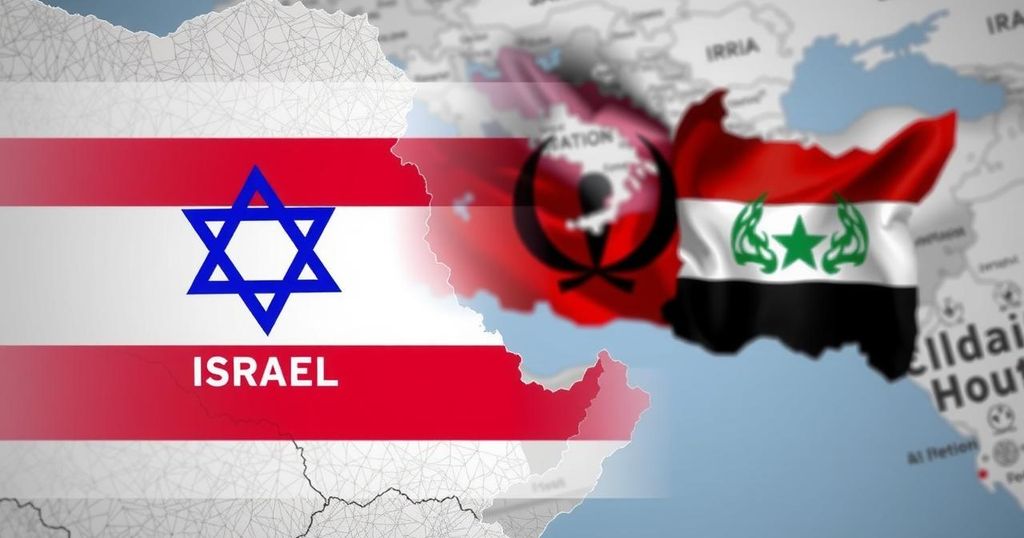Israel confronts rising missile and drone threats from Iran-backed Houthi rebels in Yemen, necessitating action against Iran to limit Houthi aggression. The Houthis have disrupted maritime traffic, affecting global trade and prompting lengthy reroutes. The challenges of confronting them in Yemen, supported by Iran’s advanced military aid, complicate Israeli retaliatory efforts.
Israel is currently facing an increasing threat from the Iran-supported Houthi rebels in Yemen, who have undertaken numerous missile and drone assaults against the nation. Despite Israel’s decisive retaliatory measures, the Houthis remain resilient, primarily due to Iran’s unwavering assistance in terms of weaponry, training, and intelligence support. The geographical complexities and the intimate integration of the Houthis within local communities complicate Israel’s ability to effectively counter this aggression.
The Houthis, known officially as Ansar Allah, have significantly disrupted maritime activities through the Bab al-Mandab strait, crucial for global trade, affecting the logistics of shipping companies and inspiring longer detours around the Cape of Good Hope. Despite a multinational coalition’s efforts, the offensive known as Operation Prosperity Guardian has not successfully mitigated the threats posed by the Houthis.
Unlike other militant groups, Yemen’s unique conditions present additional challenges. The rugged terrain offers natural fortifications for the Houthis, allowing them to endure sustained military engagements while Iranian patronage has elevated their capabilities into a regional threat. Since becoming aligned with Iran’s Axis of Resistance in 2014, the Houthis have received an array of advanced weapons and comprehensive training from the Islamic Revolutionary Guard Corps (IRGC).
Iran’s military support has transformed the Houthis into an advanced military organization, equipped with missiles, drones, and naval assets that challenge both Israeli and maritime security in the region. The provision of sophisticated systems, including the Kheibar Shekan missile, expands their reach, demonstrating the direct correlation between Iranian assistance and the Houthis’ aggressiveness toward Israel.
A critical element in this escalatory environment is the Houthis’ capacity for intelligence gathering and their ability to execute sophisticated operations, attributed significantly to the IRGC’s military training programs. This organized approach not only aims to fortify their territorial control but also serves Iran’s broader geopolitical objectives in undermining regional stability and exerting influence over maritime routes.
Examining the current dynamics reveals that any effective counter-strategy for Israel must extend beyond the Houthis, necessitating direct actions against Iranian interests and support networks. The persistence of Houthis’ aggression is not merely rooted in local grievances but is significantly driven by the backing of the Iranian regime, which empowers them to act against both Israel and global trade channels. Without addressing the Iranian nexus, the potential for ongoing and escalating threats remains profoundly concerning for both Israel and international maritime security.
The ongoing conflict involving Israel, the Houthi rebels, and Iran embodies a complex geopolitical struggle influenced by regional alliances, military capabilities, and strategic interests. The Houthis, a Yemeni group aligned with Iran, are engaged in conflicts that have far-reaching implications on regional security, particularly concerning international maritime routes and Israel’s territorial integrity. Understanding the intricacies of this conflict requires acknowledging the substantial military and logistical support provided by Iran to the Houthis, which has significantly empowered them as a formidable force in the region. The Bab al-Mandab strait serves as a critical chokepoint for global shipping and commerce, rendering it strategically essential for numerous nations, including Israel. Iranian backing enables the Houthis to disrupt trade flows, thereby intensifying international concerns regarding maritime security and the durability of Israel’s defense strategies against multilateral threats. Yemen’s difficult landscape and the Houthis’ community embeddedness further complicate the counteractions of Israel and its allies, necessitating a multifaceted approach that addresses both the Houthis and their Iranian benefactor.
The situation in Yemen and the ongoing threats from the Houthis highlight the critical need for Israel to reassess its strategic approach to countering aggression rooted in Iranian support. By recognizing the extent of Iranian influence and the complexities posed by the Houthis’ operations in Yemen, a more effective response can be crafted. Israel’s efforts to maintain its security and limit hostile actions cannot be successful without addressing the broader implications of Iran’s strategic objectives in the region.
Original Source: www.jpost.com






